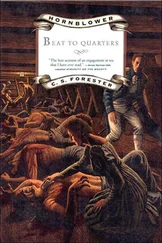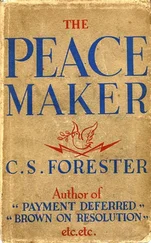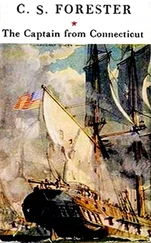Yet the desirability of striking a blow there was perfectly obvious. In roadless Poland and East Prussia the only way of distributing provisions and munitions to Bonaparte’s swelling armies was by water. His main advanced base was Danzig, whence the troops in Central Poland could be supplied by the Vistula. But the large forces in East Prussia and in eastern Poland were dependent on the other river systems, radiating from Königsberg and Elbing on the Frisches Haff. This Frisches Haff, a long narrow lagoon almost cut off from the Baltic by a long sand spit, would quite obviously be the scene of extensive barge traffic from Elbing to Königsberg. Fifty miles long, a dozen miles wide, shallow—three or four fathoms at most—with the narrow entrance guarded by the guns of the fortress of Pillau, from the French point of view it would be a perfectly safe route for water-borne supplies, sheltered both from storms and from the English. Danzig was the best objective, of course, for a stroke anywhere along this Baltic coast, but Danzig was safe, several miles from the sea up the Vistula, and heavily fortified to boot. If it took Bonaparte and a hundred thousand men three months to capture Danzig Hornblower was not likely to effect anything against the place with a couple of hundred marines. Danzig was impregnable to him. For that matter, so were Königsberg and Elbing. But it was the communications between them that he wanted to break; no more than that need be done. The wind was fair, too—a Roman would look on that as a good omen.
This was an ideal night in which to reconnoitre the entrance to the Frisches Haff. Overcast, so that not much light came from the summer sky with the sun only just below the horizon, and a strong breeze blowing—the sloop Hornblower had just quitted had single-reefed her topsails earlier in the evening. A strong breeze and a choppy sea meant that there would be far less chance of guard-boats—guard-boats manned by landsmen—rowing a close watch over this boom that Hornblower was setting out to investigate.
But at the same time Hornblower was suffering considerable personal inconvenience from the choppy sea. The cutter in whose sternsheets he sat was rearing and plunging, standing first on her bows and then on her stern, with the spray flying across her in a continuous sheet, so that a couple of hands had to bale all the time. The spray was finding its way remorselessly through the interstices of his boat-cloak, so that he was wet and cold, and the cold and the violent motion inevitably turned his mind towards seasickness. His stomach felt as uneasy as his body felt uncomfortable. In the darkness he could not see Vickery, beside him at the tiller, nor Brown tending the sheet, and he felt a poor sort of relief at the thought that his pallor and uneasiness were not apparent to them. Unlike some victims he had met he could never be seasick unselfconsciously, he told himself bitterly, and then with his usual rasping self-analysis he told himself that that should not surprise him, seeing that he was never unselfconscious at all.
He shifted his position in the stern of the cutter, and clutched his cloak more tightly round him. The Germans and Frenchmen guarding Pillau had as yet no knowledge that an English squadron was so close to them; it was less than an hour ago that he had come up in the darkness with the two sloops, leaving Nonsuch and the bomb-vessels over the horizon. A soft-hearted senior officer in Königsberg might easily hesitate before giving orders that a guard-boat should toilsomely row guard up and down the boom on such a blustery night, and even if the orders were given there was every chance that the petty officer in charge of the boat might shirk his duty—especially as there could not be much love lost between French who would occupy the higher ranks and the Germans who would fill the lower ones.
A low warning cry came from the lookout in the bows, and Vickery put down his tiller a trifle, bringing the cutter closer to the wind. She rose over a crest, and then as she came down in the trough a dark object appeared close overside, dimly visible in the darkness in a flurry of foam.
“A cable, sir,” reported Vickery. “An’ there’s the boom, right ahead.”
On the heaving surface of the sea just ahead could be seen a faint hint of blackness.
“Lay me alongside it,” said Hornblower, and Vickery turned up into the wind, and at his shouted order the lugsail came down and the cutter ranged herself against the boom. The wind was blowing not quite along it, so that there was a tiny lee on their side of the boom; on the far side the steep waves broke against it with a roar, but on this side the surface for a narrow space was smooth although covered with foam that reflected what little light made its way from the dark sky. The bowmen had hooked on to the cable just where it was secured to the boom.
Hornblower put off his cloak and left himself exposed to the spray which hurtled at him, poised himself for a leap, and sprang for the boom. As he landed on it a wave broke across it, sousing him to the skin, and he had to clutch desperately with fingers and toes to save himself from being washed off. He was riding an enormous tree trunk, floating on the surface with very little of itself exposed above the surface. With the best timber country in Europe to draw upon, and easy water transport available, it was, of course, certain that the French would select the heaviest trees possible to guard the entrance to the port. He clawed his way on all fours along the log, balancing in nightmare fashion on his pitching and rolling mount. An active topman, or Vickery for that matter, would probably walk upright, but then Hornblower wanted the evidence of his own senses regarding the boom, not a report at secondhand. The cable, when he reached it, was the largest he had ever seen in his life—a thirty-inch cable at least; the largest cable Nonsuch carried was only nineteen inches. He felt about the log with inquiring fingers while the icy water soused him to the ears, and found what he was expecting to find, one of the chain cables that attached this log to the next. It was a two-inch chain cable with a breaking strain of a hundred tons or so, heavily stapled down to the log, and further search immediately revealed another one. Presumably there were others below the surface, making four or five altogether. Even a ship of the line, charging down full tilt before the wind, would be hardly likely to break that boom, but would only cause herself desperate under-water damage. Peering through the spray, he could see the end of the next log and its cable; the gap was some ten feet only. The wind, blowing almost lengthwise along the boom, had pushed it down to leeward as far as the cables would allow, boom and cables making a herring-bone with the cables as taut as could be.
Hornblower clawed his way back down the trunk, poised himself, and leaped for the boat. In the darkness, with the irregular motion of boom and boat in the choppy sea, it was hard to time the moment to jump, and he landed awkwardly across the gunwale with one leg in the sea, and Vickery hauled him into the boat without much dignity left him.
“Let her drop down to leeward,” ordered Hornblower. “I want soundings taken at every log.”
Vickery handled the boat well. He kept her bows to the wind after shoving off, and with a couple of oars pulling steadily he manoeuvred her past each cable as the boat drifted to leeward. Brown stood amidships, balancing himself against the boat’s extravagant plunges, while he took soundings with the awkward thirty-foot sounding pole. It called for a powerful man to handle that thing in this wind, but properly used it was quicker and far less noisy than a hand lead. Four fathoms—three and a half—four—the boom was laid right across the fairway, as was only to be expected. At the windward end it was not more than a couple of hundred yards—a cable’s length—from the beach at Pillau, and Hornblower, staring into the night, more than suspected a supplementary boom from that shore which, overlapping this one, would compel any vessel entering to go about so as to make the turn. That meant that any ship trying to enter with hostile intentions would be sunk or set afire for certain by the heavy guns in Pillau.
Читать дальше












